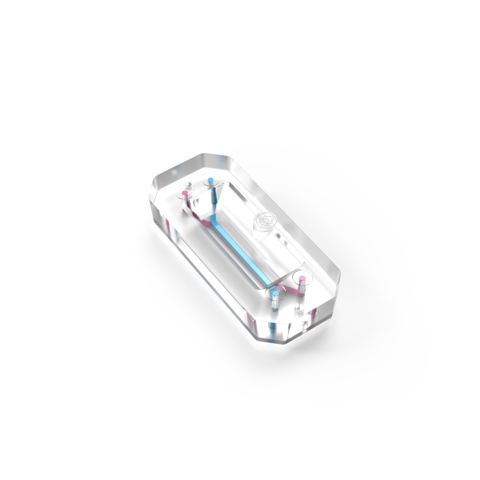Emulate, Inc. Unveils the Chip-R1™ Rigid Chip with a Minimally Drug-Absorbing Profile to Improve Biological Modeling for ADME and Toxicology Applications
Emulate, Inc. Unveils the Chip-R1™ Rigid Chip with a Minimally Drug-Absorbing Profile to Improve Biological Modeling for ADME and Toxicology Applications
Emulate, Inc., the leading provider of next-generation in vitro Organ-Chip models, today unveiled the Chip-R1™ Rigid Chip with a minimally drug-absorbing profile to improve biological modeling for ADME and Toxicology Applications. The chip is designed to minimize drug absorption and enhance biological modeling. Constructed using low-drug-absorbing plastics, Chip-R1 builds upon the core microfluidic design of Organ-Chips, offering researchers greater precision in predicting human drug responses. (Photo: Business Wire)
BOSTON--(BUSINESS WIRE)--Emulate, Inc., the leading provider of next-generation in vitro Organ-Chip models, today announced the release of its new Chip-R1™ Rigid Chip, designed to minimize drug absorption and enhance biological modeling. Constructed using low-drug-absorbing plastics, Chip-R1 builds upon the core microfluidic design of Organ-Chips, offering researchers greater precision in predicting human drug responses.
In addition to enhancing the accuracy of Organ-Chip experiments for ADME and toxicology applications, the new features of Chip-R1 can improve research across many other avenues. The modified design of the vascular channel enables physiologically relevant levels of shear stress, which is critical for vascular biology applications such as immune cell recruitment. Additionally, this model features a thinner membrane with smaller pores, enabling enhanced cellular crosstalk and better approximations of the in vivo milieu.
Novel features of Chip-R1 include:
- Minimally drug-absorbing chip materials for accurate compound testing
- Better approximation of the in vivo microenvironment through increased shear stress in the vascular channel
- A preactivated tissue culture membrane to simplify the user workflow
- Reduced imaging distance, expanding compatibility for microscopy
“This represents a step change in Emulate’s Organ-on-a-Chip technology, enabling customers to test compounds that were previously not addressable,” said Danny Levner, PhD, Chief Technology Officer at Emulate. “With its low-drug-absorbing properties, Chip-R1 is well suited for drug development applications like pharmacokinetics and pharmacodynamics, where consistent and predictable drug exposure is critical.”
Chip-R1 retains much of the same microfluidic architecture of the Chip-S1® Stretchable Chip, including co-culture to model the tissue-tissue interface, independent perfusion of the apical and basal channels, and compatibility with Emulate’s instrumentation hardware. With a new polycarbonate tissue culture membrane, Chip-R1 is better suited for organ models that do not require mechanical stretch to mimic physiological functions like peristalsis, such as liver and kidney.
“Chip-R1 showcases the continued evolution of our innovative consumables portfolio. With improved detection of hepatotoxicity compared to Chip-S1, it broadens the use of Organ-Chips to scientists who were previously concerned about how potential drug absorption impacts the accuracy of detecting drug-induced toxicity of small molecule lipophilic drugs,” said Lorna Ewart, PhD, Chief Scientific Officer at Emulate.
To learn more about the Chip-R1 Rigid Chip, visit the new webpage.
About Emulate:
Emulate is igniting a new era in human health with industry-leading Organ-on-a-Chip technology. The Human Emulation System provides a window into the inner workings of human biology and disease, offering researchers an innovative technology designed to predict human response with greater precision and detail than conventional cell culture or animal-based experimental testing. Pioneered at the Wyss Institute for Biologically Inspired Engineering at Harvard University and backed by Northpond Ventures, Founders Fund, and Perceptive Advisors, Organ-on-a-Chip technology assists researchers across academia, pharma, and government industries through its predictive power and ability to recreate true-to-life human biology. To learn more, visit emulatebio.com or follow us on LinkedIn and Twitter.
Contacts
Media Contact:
Emulate, Inc.
Veronica Mankinen
PRCommunications@emulatebio.com
781.583.3515

